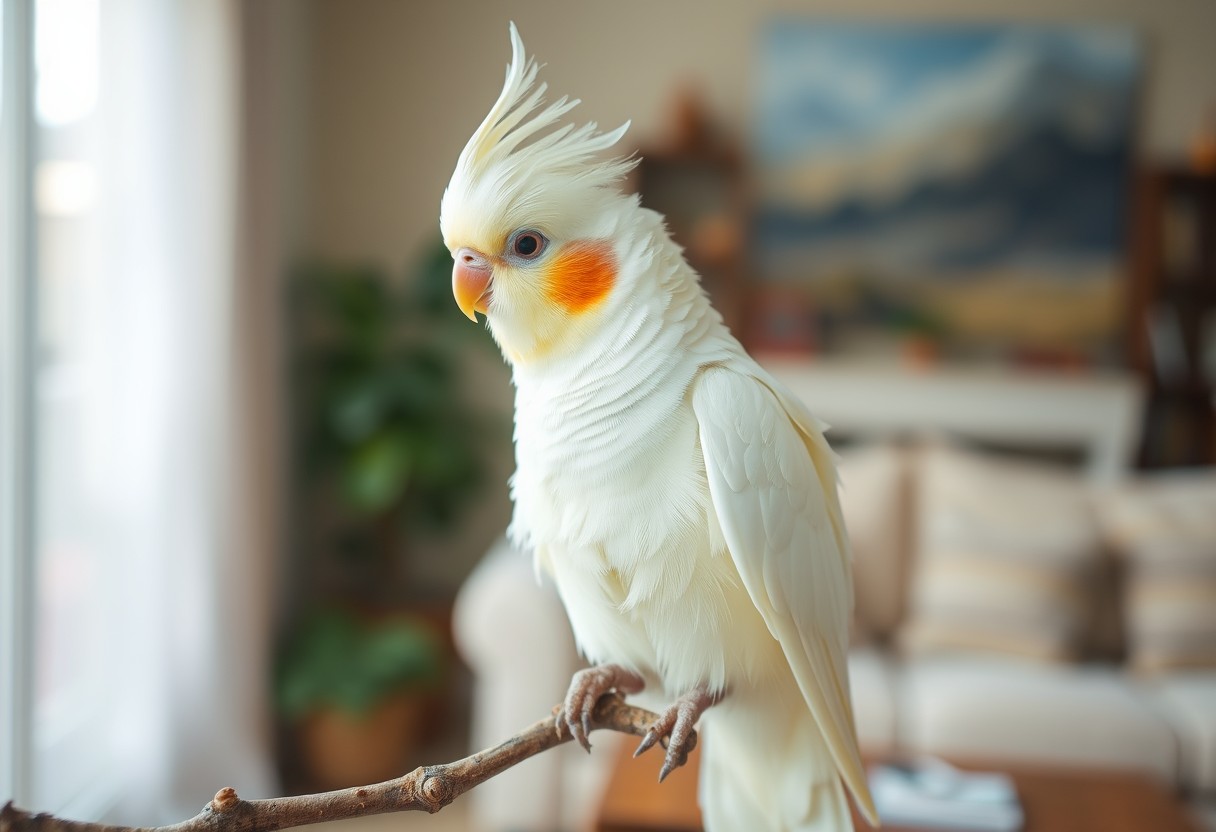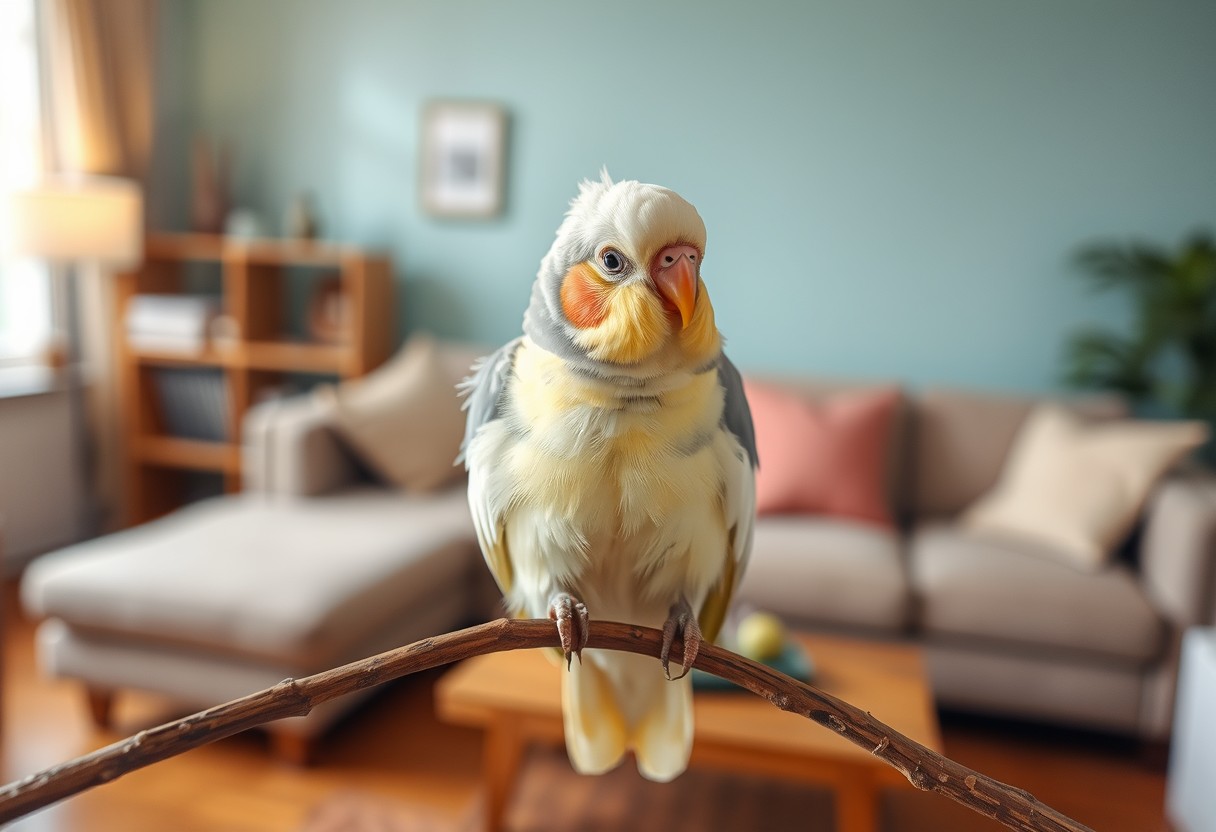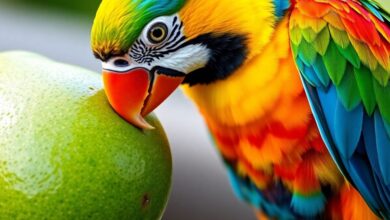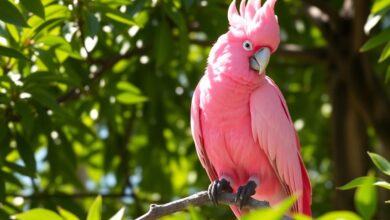
Most cockatiel owners encounter the puzzling sound of hissing at some point, which often raises questions about their feathered friend’s emotional state. Understanding why your cockatiel hisses is imperative in deciphering potential stressors or threats they may perceive in their environment. This behavior can indicate feelings ranging from discomfort to protectiveness, allowing you to respond appropriately and enhance their well-being. In this post, we will explore into the reasons behind this sound, helping you better connect with your bird and create a more harmonious home.
Key Takeaways:
- Communication: Cockatiels hiss as a form of vocal expression, indicating their feelings like discomfort or annoyance.
- Stress Signals: Hissing can be a sign of stress or fear, especially when they feel threatened or cornered.
- Behavioral Context: Understanding the situation surrounding the hissing can provide insights into their needs and emotional state.

Understanding Cockatiel Communication
All pets possess their unique ways of expressing themselves, and cockatiels are no different. As you observe your cockatiel, you’ll notice a range of vocalizations and body language that serve as forms of communication. This vibrant species uses a combination of sounds and gestures to convey feelings and intentions, highlighting their intelligent and social nature. Understanding these signals can enhance your bond with your pet and improve your care strategies.
Vocalization vs. Hissing
Across the spectrum of cockatiel sounds, vocalizations can signify a variety of emotions and responses, while hissing often serves a more distinct purpose. Vocal sounds usually indicate happiness, curiosity, or excitement, whereas hissing is a more focused sign of distress or discomfort that deserves your attention. Recognizing this difference will help you better respond to your cockatiel’s needs.
Contextual Meaning of Hissing
Among the various signals your cockatiel exhibits, hissing is particularly noteworthy as it can signify a variety of emotional states. It typically occurs when your bird feels threatened or defensive. This warning sound informs you that your pet might be in a state of fear or irritation, urging you to assess the environment for potential stressors. It’s crucial to acknowledge this behavior, as ignoring it may lead to increased anxiety for your cockatiel.
Indeed, understanding the contextual meaning of hissing can provide valuable insight into your cockatiel’s emotional state. If you hear your cockatiel hiss, take a moment to evaluate their surroundings for any potential threats or sources of distress, such as loud noises, unfamiliar animals, or sudden movements. This sound can also signify that your cockatiel wants some personal space, so give them a moment to calm down. Recognizing these signs will not only enhance your connection with your pet but also help you create a more comforting environment for your feathered friend.

Triggers for Hissing in Cockatiels
While understanding the reasons behind your cockatiel’s hissing can improve your relationship with your feathered friend, several triggers contribute to this behavior. You can explore more in detail at Why Do Cockatiels Hiss? 7 Reasons & What to Do – PangoVet. Common triggers include:
- Fear
- Anxiety
- Defensiveness
- Overstimulation
Knowing these triggers can help you manage your cockatiel’s environment better.
Environmental Factors
Against the backdrop of various stimuli, an unsettling environment can lead to hissing in your cockatiel. Sudden loud noises, unfamiliar surroundings, or the presence of other pets may provoke anxiety. Additionally, changes in your home, such as rearranging furniture, can stress your bird. Ensuring a calm and stable atmosphere is necessary for their well-being.
Interaction with Humans and Other Pets
Between you and your cockatiel, interactions play a significant role in shaping their behavior. Friendly encounters may nurture a bond, while abrupt movements or loud voice changes can trigger hissing as a defensive response. Encouraging gentle handling and positive reinforcements will foster trust, mitigating their need to hiss.
Factors influencing a cockatiel’s hissing behavior during interactions include how you approach them, your body language, and the presence of other pets. If you adopt a friendly demeanor and ensure your movements are calm and slow, your cockatiel will feel more secure. On the contrary, if your other pets display aggressive behavior, it may cause your bird to feel threatened, resulting in hissing as a warning or distress signal. Creating a positive environment fosters healthy interactions.
Hissing as a Form of Defense
Many people may not realize that hissing in cockatiels is often a behavioral response when they feel threatened. This vocalization serves as a warning signal to potential threats, indicating that your feathered friend is feeling uncomfortable or scared. Understanding this natural instinct is key to ensuring your cockatiel feels secure in its environment. When you recognize hissing as a form of defense, you can better address the underlying causes that lead to this behavior.
Fear and Anxiety Responses
Around your cockatiel, you might notice behaviors reflecting feelings of fear or anxiety, such as hissing. This reaction can arise from sudden changes in their surroundings, unfamiliar faces, or loud noises. It’s important to create a safe and calm space for your pet, as reducing stressors can help minimize hissing responses and lead to a more relaxed bird.
Establishing Territory
Territory is an imperative aspect of your cockatiel’s behavior. When they hiss, they may be marking their space and asserting dominance within their environment. This vocalization serves as a signal to others that they are not to be approached. It’s vital to respect your cockatiel’s territorial boundaries to foster a harmonious living situation and reduce any unnecessary stress.
The territorial instincts of your cockatiel can be significantly influenced by their perceived space. If they feel that their area is being encroached upon—by other pets or even humans—they may resort to hissing as a form of defense. Providing your bird with a defined territory, such as a private cage or corner, can help them feel more secure. Recall, ensuring that your cockatiel has its own safe zone allows it to express its natural behaviors without feeling threatened, leading to a happier and healthier pet.

Social Dynamics Among Cockatiels
Once again, understanding your cockatiel’s social behavior is key to interpreting their hissing. These birds are naturally social creatures, often forming complex relationships within their flock. In a household setting, they establish their own hierarchies and dynamics, which can lead to a variety of vocalizations, including hissing. Observing how your cockatiels interact can provide valuable insight into their social structure and emotional well-being.
Hissing in Social Hierarchies
Between different cockatiels, hissing serves as an important form of communication, indicating both position within the social hierarchy and displaying territoriality. When one cockatiel hisses, it may be asserting dominance or warning another bird to stay away from its space or resources. Recognizing these social cues helps you maintain harmony among your feathered friends.
Playful vs. Aggressive Hissing
Around playful moments, you may notice hissing that can easily be misinterpreted as aggressive. Cockatiels often engage in playful behavior that includes hissing, which can be a sign of excitement rather than hostility. Understanding this distinction is important for you as a bird owner, as it helps in assessing your cockatiel’s mood accurately.
Hissing can be a mixed signal, and understanding its context is vital. Playful hissing usually occurs during social interactions, when your cockatiel is excited or engaged in play, often accompanied by other lively behaviors. In contrast, aggressive hissing may arise during disputes over territory or food, and could escalate into confrontation. By observing the body language and overall demeanor of your cockatiel, you can discern whether the hissing indicates a friendly interaction or a warning to back off, keeping both your pets safe and happy.
Assessing Your Cockatiel’s Health
After observing your cockatiel’s hissing behavior, it’s important to assess their overall health. A hiss may indicate stress or discomfort, but it can also be a sign of a hidden health issue. You can learn more about this in detail in this article on Cockatiel Hissing – Reasons & What To Do. Regular check-ups and paying attention to changes in their behavior will help you keep them healthy and happy.
When Hissing Indicates Illness
Illness can sometimes manifest itself through your cockatiel’s hissing. If your pet exhibits a sudden increase in vocalizations, especially hissing, alongside other signs like lethargy or changes in appetite, then it may indicate a health concern that requires veterinary attention.
Behavioral Changes to Monitor
At times, observing your cockatiel’s behavior closely can reveal underlying issues. Look for changes in their interaction with you or their environment, as well as alterations in their grooming habits. These changes can be subtle but may alert you to potential health problems.
And so, it’s vital to pay attention to any sudden withdrawal from play, a noticeable decrease in vocalizations, or changes in their grooming patterns. If your cockatiel appears to be fluffed up or seems to be isolating from their surroundings, it could signal an illness. Early detection of these behavioral changes can make a significant difference in ensuring the health and well-being of your feathered friend.
Managing Hissing Behavior
For many cockatiel owners, understanding why your bird hisses is vital for a harmonious relationship. If a cockatiel hisses at you, does that mean it is not scared of you? The answer lies in the reason behind the hissing. Identifying triggers and adjusting their environment can significantly reduce this behavior, promoting a stronger bond between you and your pet. You can start by creating a calm atmosphere, avoiding sudden movements, and offering safe spaces for your cockatiel.
Tips for Reducing Stress
At home, you can implement various strategies to help your cockatiel feel less stressed:
- Maintain a consistent routine
- Provide plenty of mental stimulation and toys
- Ensure a comfortable living environment
- Limit exposure to loud noises
Recognizing the signs of stress in your cockatiel will assist you in addressing their needs properly.
Positive Reinforcement Techniques
After identifying the triggers for your cockatiel’s hissing, it is vital to employ positive reinforcement techniques. Associating desired behaviors with rewards will help your bird feel more secure and confident. Start by offering treats and praise when your cockatiel interacts calmly with you, gradually reducing hissing episodes.
This approach strengthens your bond while encouraging positive behaviors. Focus on giving your cockatiel treats, verbal praise, and gentle interactions when they respond positively or remain calm around you. Consistency is vital, as it helps your bird associate your presence with safety and comfort. Ultimately, employing these positive reinforcement tactics fosters a trusting relationship, making hissing less frequent as your cockatiel learns to feel secure in your care.
Conclusion
To wrap up, understanding why your cockatiel hisses can enhance your bond with them and improve your care. Hissing often signifies discomfort, annoyance, or a need for space, so pay attention to your bird’s body language. By recognizing these signs, you can create a more comfortable environment and respond appropriately to your cockatiel’s needs. This awareness will lead to a happier and healthier relationship with your feathered friend.
FAQ
Q: Why do cockatiels hiss?
A: Cockatiels hiss as a form of communication and expression of their feelings. This behavior can indicate that the bird is feeling threatened, upset, or annoyed. Hissing is typically a warning sign, suggesting that the bird wants to be left alone or is preparing to defend itself. Understanding this behavior can help owners provide a more supportive environment and reduce stress for their pets.
Q: How can I tell if my cockatiel is hissing out of fear or aggression?
A: To discern the cause of your cockatiel’s hissing, observe their body language and the context of the situation. If the bird is puffed up, has its feathers fluffed, or is backing away, it may be fearful. In contrast, if the hissing is accompanied by aggressive posturing, such as a forward stance, raised feathers, and an open beak, it likely indicates aggression. Watching for these signs can help you react appropriately and ensure your bird feels safe.
Q: What should I do if my cockatiel hisses at me?
A: If your cockatiel hisses at you, it’s important to assess the situation calmly. Gradually back off and give your bird space to feel secure. Avoid forcing interactions during these moments, as this can increase anxiety. Instead, allow your cockatiel to come to you on its own terms. Additionally, building trust through positive reinforcement, such as offering treats or engaging in gentle training, can help improve your relationship and reduce hissing behavior over time.




